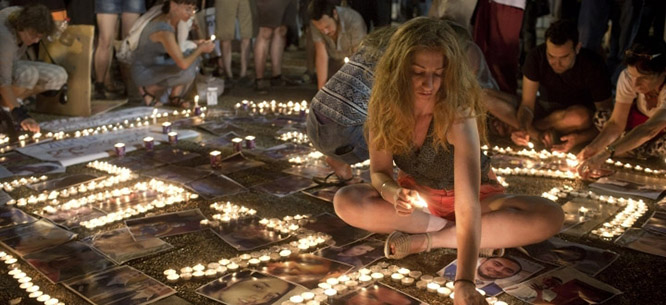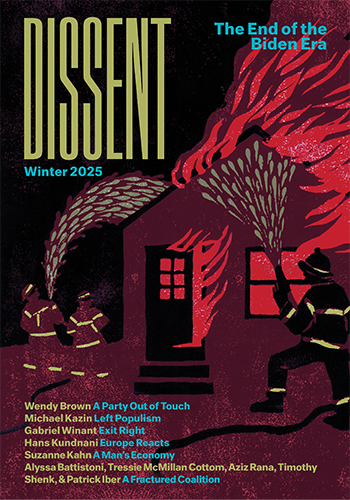Beyond Protest: War and the Israeli Left
Beyond Protest: War and the Israeli Left

Many Israelis who define themselves as “on the left” (about 20 percent of the population on a good day) support Operation Protective Edge. It’s a small and lonely subset that is both left wing and opposes the war. Over the last month, this little constituency has faithfully staged demonstrations of a few hundred—with last Saturday’s rally reaching somewhere between 3,000 and 5,000, by organizers’ estimates—and has written articles of protest. But the demonstrators tend to use such general slogans as “Jews and Arabs refuse to be enemies” or “No, no, we won’t let fascism come to pass” (the latter chanted at right-wing counter-demonstrators). The antiwar left in Israel is clearly upset, but it has neither generated a coherent line of critique about the war nor formulated demands or proposals for alternate approaches other than calling for a ceasefire. Its influence, as a result, is severely limited.
There are three main reasons why it is so hard to create an effective opposition line, let alone gather supporters and momentum: the circumstances of this particular war (and the two previous rounds); the general climate of opinion in Israel; and the left’s own weaknesses, including baggage of the distant past.
First, the current circumstances make opposition very difficult, on the surface. Hamas is a miserable political regime that imposes religious fundamentalism on Gazans, stifles women, and kills collaborators. It has fired rockets at Israeli towns for over a decade and dragged Gaza into wars that were bound to kill its civilians. Not content with rockets, it has dug tunnels for terrorists targeting Israeli civilians. It is not hard to understand, in these conditions, the case for a forceful response on Israel’s part.
Unless, that is, one considers history before June 30, when the bodies of the three kidnapped Israeli teens were found. Prime Minister Benjamin Netanyahu was already outraged by a Hamas-Fatah reconciliation deal made in late April that created an interim technocratic government without Hamas and called for Palestinian elections. That would have meant a more unified Palestine, something Netanyahu has worked hard to destroy. Using the abducted teens as a pretext, without providing evidence of Hamas’ involvement—an Israeli police spokesperson allegedly admitted this weekend that it wasn’t directly responsible—the prime minister ordered a sweeping West Bank operation against the organization, just as much a provocation as Hamas’s later actions. Rockets fell on southern Israel like clockwork. Before that, Gaza was under various forms of blockade for seven years. Even moderate Palestinians in Gaza would rather die now, I have had some tell me, than suffer slow suffocation. This alternate reality is rarely discussed.
Second, the Israeli climate of opinion is hostile. There has been right-wing rage and violence before: in 1983, a Peace Now demonstrator was killed; in 1995, a prime minister was assassinated. For now, extremists on the right are content to express hatred of the left, call them traitors, and call for their death, along with Arabs. There have been violent scuffles. As unpleasant as this environment is, though, the recent larger demonstration shows that it probably don’t intimidate anyone still committed enough to oppose the war.
The deeper scourge is apathy; Israelis on the whole show little interest in either peace or Palestinians. They didn’t pay attention to the peace negotiations and they aren’t paying attention to a few thousand demonstrators against a war they believe was forced upon them. “What is, is what will be,” goes a Hebrew saying. The counter-demonstrators may even be doing the antiwar camp a favor by getting them into the paper. Meanwhile, a Channel 10 poll shows that 87 percent of Israelis prefer to continue fighting rather than accept a ceasefire—a 14-point rise from a survey conducted before the ground operation began.
But the left itself also bears some responsibility for its weak impact. First, opposition to the war can easily appear as a knee-jerk reaction rooted in habit rather than reality. The lack of a coherent critical message feeds that image.
There are deeper problems, too. For most of its history, the left has argued that peace would bring security. In practice, that didn’t work. Israelis largely believe this conflict is symmetrical, but they reject equal Israeli and Palestinian responsibility for the failures of peace efforts. They instead blamed the aborted peace processes—Oslo and the Camp David negotiations of 2000—for the security they never received. In recent years, they’ve ignored Palestinian Authority security cooperation and nonviolent Palestinian political tactics, and credit only the separation barrier for (relative) calm inside Israel.
The left needs to update its arguments. “Peace brings security” is inaccurate and unrealistic. Instead, the case needs to be made that a diplomatic solution is the only way to stop inevitable escalation by extremists and full-blown wars every few years. No country has eradicated violence. The question is how to contain it.
Justifiably losing patience, the left has searched for sticks, toying with boycott and international pressure—but those just reinforce the bitter accusation of betrayal among Israelis. Carrots—incentives—are a necessary alternative, but they are hard to find, since Israel has all the allies, alliances, and trade relations it wants.
Still, there are tactics that haven’t been tested: pressure from within—for example, in the form of civil disobedience—has not been widespread beyond a handful of draft refusers. Outside pressure from “our own”—imagine liberal American Jews appealing directly to their Israeli kin—is more likely to resonate with most Israelis than UN condemnations that make Israelis dig in and change nothing on the ground.
Different approaches must be found. Israel needs them—and Palestine, too.
Dahlia Scheindlin is a public opinion researcher and a political strategist, as well as an adjunct lecturer at Tel Aviv University. She writes a regular column at +972 Magazine.




